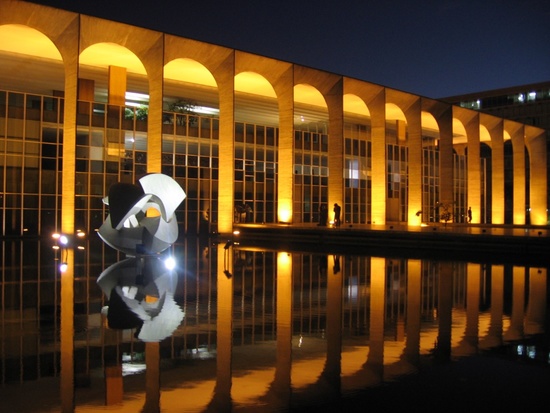1. How many diplomats does an emerging power need? (October 14)
One important but usually neglected factor when analyzing foreign policy is the size of a country’s foreign service. Smart strategies developed at the Foreign Ministry at home can fail to have the desired impact because there are not enough foreign service officers to implement the new policy. Complex bilateral negotiations can be negatively affected if one side’s negotiators have not been briefed properly due to a lack of diplomatic staff and on-the-ground knowledge on the domestic constraints the other side is facing.
2. Who will make the rules in tomorrow’s world? (November 24)
Where will the ideas come from that create the intellectual basis for an alternative global order? Emerging powers challenge the notion that Western norms are superior to those of the rest of the world, and the rhetoric used during BRICS Summits is clearly revisionist, but it lacks an overarching coherence that could translate into tangible institutions and structures to replace the current ones. Chinese visions of potential alternatives to the current global order remain virtually unknown, and China makes no overt attempt to promote them abroad.
3. Can India and China resolve their differences? (May 10)
Whenever two rising powers sit next to each other, the chance for conflict greatly increases as their growing spheres of influence quickly overlap – one of the main reason why Europe’s history is full of bloody wars. This unfortunate constellation now becomes increasingly visible in Asia, where a rising China and a rising India begin to claim influence over the same regions. After India and Vietnam agreed to jointly explore oil in the South China Sea, an aggressive op-ed in The Global Times (a Chinese newspaper) recently accused India of “poking its nose where it does not belong.”
4. India – The next Superpower? (March 6)
When Hillary Clinton visited India in 2009, the US Secretary of State’s verdict was unequivocal: ‘I consider India not just a regional power, but a global power.’ Following the success of economic liberalisation in the 1990s, which generated growth rates in excess of 8% and a rising middle class, expectations have grown that India might become a superpower, particularly in a West that sees in India’s democratic heritage the potential for strategic partnership.
5. Emerging powers and the Responsibility to Protect (April 8)
As new powers like Brazil, India and China rise to the top of the international order”, Michael Ignatieff wrote recently, “their resistance to intervention will become increasingly influential. ‘Responsibility to protect’ will continue to frame the terms of debate, but it has a long way to go before it becomes customary international law.” Yet emerging powers are far from certain about their traditional stance on non-interference and rejection of R2P. As their national interests begin to change in function of their economic and geopolitical rise, the debate about what role sovereignty should play is gaining momentum in Brasília, Delhi and Beijing.
6. Emerging powers remain divided on R2P and RwP (July 8)
The debate about military intervention and the ‘Responsibility to Protect’ (R2P) is often seen as dominated by reckless and pro-interventionist Western powers on the one side, and strongly westphalian and amoral non-Western emerging powers on the other. Yet Russia’s and China’s traditional anti-interventionist position is strongly contrasted by Turkey’s increasingly hawkish stance on Syria and India’s and Brazil’s reluctance to fully align with its fellow BRICS members (Brazil and India both voted in favor of a resolution in the UN General Assembly that condemned the violent crackdown in Syria).
7. Como a imigração mudará o Brasil (May 9)
Por décadas, ir para o exterior era visto como o maior sonho possível para muitos jovens brasileiros. “Lá fora” seria o melhor lugar para viver. Por isso, pode ser desconcertante ver um número crescente de jovens estrangeiros altamente qualificados, e que poderiam encontrar emprego em qualquer canto do mundo, chegarem e se instalarem no Brasil. Mas o número de estrangeiros – qualificados e não-qualificados – vindo ao Brasil está aumentando, atraídos pelo crescimento econômico inédito, os salários competitivos e uma sociedade mais ocidentalizada do que qualquer outra entre os países dos BRICS.
8. Brazil in Africa: Bridging the Atlantic (January 15)
Aside from having been united by geography millions of years ago (Brazil and Africa formed the single continent Gondwana, as the shapes of both Brazil’s and West Africa’s shorelines attest), the transatlantic slave trade (which ended in 1850) created a strong and irreversible cultural connection between Africa and Brazil – more slaves were brought to Brazil than to any other country in the Western Hemisphere, including the United States. While President Fernando Henrique Cardoso (1995-2002) set the stage for diversifying Brazil’s partnerships after the end of the Cold War, it was President Lula (2003-2010) who made Africa a strategic priority.
9. Can Brazil learn to manipulate China? (February 4)
One of the key questions for Brazilian decision makers – both in domestic and foreign policy – this year will be how to deal with China’s growing influence. Brazil’s strategy is not only crucial for the bilateral ties between China and Brazil, but also fundamentally influences the way Brazil would like to position itself in the larger context of an historic and inexorable shift of power towards the BRICS.
10. Book review: “Liberal Leviathan” by G. John Ikenberry (April 1)
Ikenberry argues that the ‘liberal Leviathan’ will have to regain its lost authority and share responsibility. While the Bush administration weakened the liberal characteristics of the system and strengthened the imperial ones, the U.S. should commit more to the rules and norms – which would help stay at the center of the system for decades to come, and avoid the decline of the system. At the same time, it needs to strengthen the rules of the system and “recover the public philosophy of internationalism” in preparation of the moment when China will surpass the United States as the world’s most powerful actor.
Photo credit: Xenia Antunes (Creative Commons)









